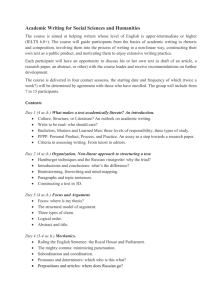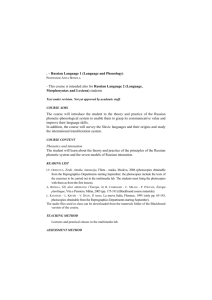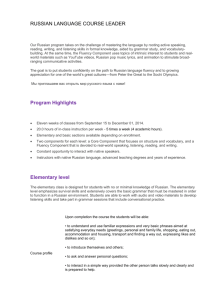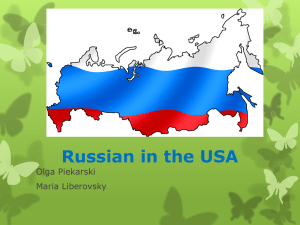Russian language III (Language and professional communication)
advertisement
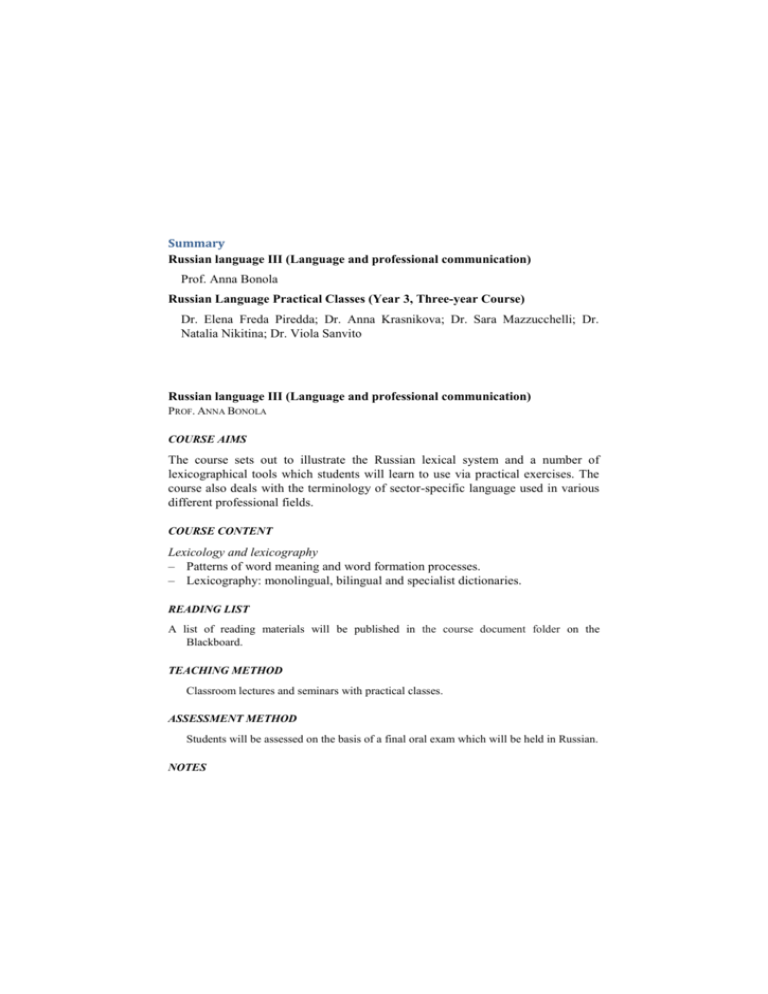
Summary Russian language III (Language and professional communication) Prof. Anna Bonola Russian Language Practical Classes (Year 3, Three-year Course) Dr. Elena Freda Piredda; Dr. Anna Krasnikova; Dr. Sara Mazzucchelli; Dr. Natalia Nikitina; Dr. Viola Sanvito Russian language III (Language and professional communication) PROF. ANNA BONOLA COURSE AIMS The course sets out to illustrate the Russian lexical system and a number of lexicographical tools which students will learn to use via practical exercises. The course also deals with the terminology of sector-specific language used in various different professional fields. COURSE CONTENT Lexicology and lexicography – Patterns of word meaning and word formation processes. – Lexicography: monolingual, bilingual and specialist dictionaries. READING LIST A list of reading materials will be published in the course document folder on the Blackboard. TEACHING METHOD Classroom lectures and seminars with practical classes. ASSESSMENT METHOD Students will be assessed on the basis of a final oral exam which will be held in Russian. NOTES The course lasts for one semester for students in their third year with "Business language expert","International relations language expert" and “Expert Linguist for Management and Tourism” profiles, to take place in the first semester. The course is also compulsory for students with one-year Russian language in their curriculum (Language and linguistics A or B) comprising Russian language II (Language, morpho-syntax and lexicon) and Russian language III (Language and professional communication) courses. Further information can be found on the lecturer's webpage at http://docenti.unicatt.it/web/searchByName.do?language=ENG or on the Faculty notice board. Russian Language Practical Classes (Year 3, Three-year Course) DR. ELENA FREDA PIREDDA; DR. ANNA KRASNIKOVA; DR. SARA MAZZUCCHELLI; DR. NATALIA NIKITINA; DR. VIOLA SANVITO COURSE AIMS The course plans to develop the student’s abilities in spoken and written Russian to the advanced level (corresponding to the TRKI B2 level). The course is split into two parts: Italian translation course (Dr. Elena Freda Piredda; Dr. Sara Mazzucchelli; Dr. Viola Sanvito) – Use of syntactic constructions for translating Russian into Italian. – Analysis of the structure and lexicon of articles on current topics, culture and politics. – Use of dictionaries for translating from Russian into Italian. Russian translation course and exam preparation (Dr. Anna Krasnikova; Dr. Natalia Nikitina) – Exercises on translating articles on current affairs from Italian to Russian. – Grammar with oral and written exercises. – Introduction to the interpreter’s profession based on oral exercises, enriching the professional vocabulary and the listening comprehension of texts. – Preparation for written output and spoken communication. COURSE CONTENT GRAMMAR 1. Declension of names and geographical names 1.1 Declension of names, last names, and Russian patronymic names, foreign names. 1.2 Declension of geographic names. 2. Numerals 2.1 Declension of cardinal and ordinal numerals, including compound numbers; collective numerals; use and declension of «оба-обе», «полтора»; doing arithmetic; fractions and decimals; percentages. 3. Expressing time 3.1 Dates (5 мая 1980 года, в январе 2011, в 2000 году). 3.2 By way of abstract dates (век, эпоха, период). 3.3 Use of the preposition «на» (вышел на час). 3.4 Use of the preposition «за» (прочитал за час). 3.5 Use of the prepositions “к” and «до» (к среде, до обеда). 3.6 Indication of time in iterative actions (каждый, ежедневно, по ночам). 3.7 Use of the prepositions c-по and с-до (с января по октябрь / с утра до вечера). 3.8 The instrumental case to define time with «утро, весна». 3.9 Use of the prepositions «после», «через», «спустя». 3.10 Indication of the time that separates two events («через год»). 3.11 Use of the prepositions «перед» and «до». 3.12 How to indicate how much time lapses before an action («за час до приезда»). 3.13 Action that takes place at irregular intervals («через день, раз в день»). 4. Pronouns 4.1 The pronouns «сам, сама, само, сами». 4.2 The pronouns and adjectives «такой же, тот же самый». 4.3 The interrogative pronouns «чей, чья, чьё, чьи». 4.4 The negative pronouns and adjectives «никто, ничто, никакой, ничей». 4.5 The negative pronouns «нéкого, нéчего». 5. Verbs 5.1 I Reflexive verbs – enrichment of the usage vocabulary. 5.2 Verbal aspects: 5.2.1 Aspect of the verb in the future tense with negation: не буду читать – не прочитаю. 5.2.2 Expression of need + НСВ оr СВ: должен / не должен, нужно / не нужно, нельзя, следует, придётся, обязан etc. 5.2.3 Aspects of the verb in the infinitive: verbs that always take СВ and НСВ. 5.3 Passive form. 5.4 Verbs of motion with prefixes. 5.5 Imperative of verbs of motion. 6. Participles 6.1 In-depth study of the use of active and passive participles. 6.2 Consonantal alternants in participles. 6.3 Use of inversion in participial constructs. 7. Gerund 7.1 In-depth study of the use of the gerund. 8. Lexical issues SYNTAX 1. Use of БЫ- ЧТО- ЧТОБЫ in complex and subordinate propositions supported by the conjunctive будто. 2. Temporal propositions: expression of anteriority, posterity, contemporaneity (перед тем, как; после того, как; до того, как; пока не…). 3. Causal propositions (так как; поскольку…). 4. Concessive propositions (хотя; несмотря на то, что). 5. Use of the constructions: то, что / тот, кто. READING LIST N. NIKITINA, Manuale di lingua russa per il 3 anno, EDUCatt, Milan, 2014. N. NIKITINA, Esercizi di lingua russa. Morfologia: livello avanzato con soluzioni, Hoepli, Milan, 2013. Dispensa per la traduzione in italiano (Course pack of Professor Freda Piredda, Reprographics Shop). C. CEVESE-JU. DOBROVOLSKAJA-E. MAGNANINI, Grammatica russa. Morfologia: teoria ed esercizi, Hoepli, Milan, 2004. C. CEVESE-JU. DOBROVOLSKAJA, Sintassi russa: teoria ed esercizi, Hoepli, Milan, 2004. TEACHING METHOD Lectures. ASSESSMENT METHOD Students completing the Russian Language Practical Classes will sit final exams to assess their knowledge of written and spoken Russian. Final grades will take account of the student’s attendance rate and the learning benefits gained from participating in the class activities and from their home study, which will be assessed throughout the year with intermediate tests. The final exams are in two parts: Written exam – Lexicon and grammar test – Summarise a Russian text read out loud by the lecturer – Short Italian-into-Russian translation (current affairs article) – Short Russian-into-Italian translation (current affairs article) Students may use both a monolingual and a bilingual dictionary exclusively for the translation parts. Oral exam The oral exam will test the student’s ability to read, translate and summarise the home reading (around 100 pages of original-language texts set by the lecturer during the course) and to hold a conversation on the texts read. In addition, the student must know how to read and translate on-sight the advanced-level Russian text given to them at the exam and to converse in Russian on its content. NOTES The students must carefully check the timetable and attend only those classes marked for their group and curriculum. Further information can be found on the lecturer's webpage at http://docenti.unicatt.it/web/searchByName.do?language=ENG, or on the Faculty notice board.



